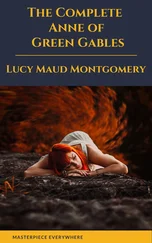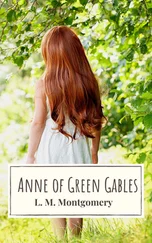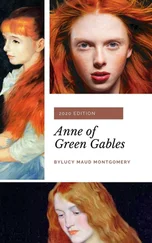“What a beautiful …”
“Oh, yes, that was my Aunt Emilia … not my aunt really, of course. Just the wife of Uncle Alexander. She was noted for her spiritual look, but she poisoned her husband with a stew of mushrooms … toadstools really. We always pretended it was an accident, because a murder is such a messy thing to have in a family, but we all knew the truth. Of course she married him against her will. She was a gay young thing and he was far too old for her. December and May, my dear. Still, that did not really justify toadstools. She went into a decline soon afterwards. They are buried together in Charlottetown … all the Tomgallons bury in Charlottetown. This was my Aunt Louise. She drank laudanum. The doctor pumped it out and saved her, but we all felt we could never trust her again. It was really rather a relief when she died respectably of pneumonia. Of course, some of us didn’t blame her much. You see, my dear, her husband had spanked her.”
“Spanked …”
“Exactly. There are really some things no gentleman should do, my dear, and one of them is spank his wife. Knock her down … possibly … but spank her, never! I would like,” said Miss Minerva, very majestically, “to see the man who would dare to spank me.”
Anne felt she would like to see him also. She realized that there are limits to the imagination after all. By no stretch of hers could she imagine a husband spanking Miss Minerva Tomgallon.
“This is the ballroom. Of course it is never used now. But there have been any number of balls here. The Tomgallon balls were famous. People came from all over the Island to them. That chandelier cost my father five hundred dollars. My Great-aunt Patience dropped dead while dancing here one night … right there in that corner. She had fretted a great deal over a man who had disappointed her. I cannot imagine any girl breaking her heart over a man. Men,” said Miss Minerva, staring at a photograph of her father … a person with bristling sidewhiskers and a hawk-like nose … “have always seemed to me such trivial creatures.”
Table of Contents
The dining-room was in keeping with the rest of the house. There was another ornate chandelier, an equally ornate, gilt-framed mirror over the mantelpiece, and a table beautifully set with silver and crystal and old Crown Derby. The supper, served by a rather grim and ancient maid, was bountiful and exceedingly good, and Anne’s healthy young appetite did full justice to it. Miss Minerva kept silence for a time and Anne dared say nothing for fear of starting another avalanche of tragedies. Once a large, sleek black cat came into the room and sat down by Miss Minerva with a hoarse meow. Miss Minerva poured a saucer of cream and set it down before him. She seemed so much more human after this that Anne lost a good deal of her awe of the last of the Tomgallons.
“Do have some more of the peaches, my dear. You’ve eaten nothing … positively nothing.”
“Oh, Miss Tomgallon, I’ve enjoyed …”
“The Tomgallons always set a good table,” said Miss Minerva complacently. “My Aunt Sophia made the best sponge-cake I ever tasted. I think the only person my father ever really hated to see come to our house was his sister Mary, because she had such a poor appetite. She just minced and tasted. He took it as a personal insult. Father was a very unrelenting man. He never forgave my brother Richard for marrying against his will. He ordered him out of the house and he was never allowed to enter it again. Father always repeated the Lord’s Prayer at family worship every morning, but after Richard flouted him he always left out the sentence, ‘Forgive us our trespasses as we forgive those who trespass against us.’ I can see him,” said Miss Minerva dreamily, “kneeling there leaving it out.”
After supper they went to the smallest of the three drawing-rooms … which was still rather big and grim … and spent the evening before the huge fire … a pleasant, friendly enough fire. Anne crocheted at a set of intricate doilies and Miss Minerva knitted away at an afghan and kept up what was practically a monologue composed in great part of colorful and gruesome Tomgallon history.
“This is a house of tragical memories, my dear.”
“Miss Tomgallon, didn’t any pleasant thing ever happen in this house?” asked Anne, achieving a complete sentence by a mere fluke. Miss Minerva had had to stop talking long enough to blow her nose.
“Oh, I suppose so,” said Miss Minerva, as if she hated to admit it. “Yes, of course, we used to have gay times here when I was a girl. They tell me you’re writing a book about every one in Summerside, my dear.”
“I’m not … there isn’t a word of truth …”
“Oh!” Miss Minerva was plainly a little disappointed. “Well, if ever you do you are at liberty to use any of our stories you like, perhaps with the names disguised. And now what do you say to a game of parchesi?”
“I’m afraid it is time I was going… .”
“Oh, my dear, you can’t go home tonight. It’s pouring cats and dogs … and listen to the wind. I don’t keep a carriage now … I have so little use for one … and you can’t walk half a mile in that deluge. You must be my guest for the night.”
Anne was not sure she wanted to spend a night in Tomgallon House. But neither did she want to walk to Windy Poplars in a March tempest. So they had their game of parchesi … in which Miss Minerva was so interested that she forgot to talk about horrors … and then a “bedtime snack.” They ate cinnamon toast and drank cocoa out of old Tomgallon cups of marvelous thinness and beauty.
Finally Miss Minerva took her up to a guestroom which Anne at first was glad to see was not the one where Miss Minerva’s sister had died of a stroke.
“This is Aunt Annabella’s room,” said Miss Minerva, lighting the candles in the silver candlesticks on a rather pretty green dressing-table and turning out the gas. Matthew Tomgallon had blown out the gas one night … whereupon exit Matthew Tomgallon. “She was the handsomest of all the Tomgallons. That’s her picture above the mirror. Do you notice what a proud mouth she had? She made that crazy quilt on the bed. I hope you’ll be comfortable, my dear. Mary has aired the bed and put two hot bricks in it. And she has aired this nightdress for you …” pointing to an ample flannel garment hanging over a chair and smelling strongly of moth balls. “I hope it will fit you. It hasn’t been worn since poor Mother died in it. Oh, I nearly forgot to tell you …” Miss Minerva turned back at the door … “this is the room Oscar Tomgallon came back to life in — after being thought dead for two days. They didn’t want him to, you know — that was the tragedy. I hope you’ll sleep well, my dear.”
Anne did not know if she could sleep at all or not. Suddenly there seemed something strange and alien in the room … something a little hostile. But is there not something strange about any room that has been occupied through generations? Death has lurked in it … love has been rosy red in it … births have been here … all the passions … all the hopes. It is full of wraths.
But this was really rather a terrible old house, full of the ghosts of dead hatreds and heartbreaks, crowded with dark deeds that had never been dragged into light and were still festering in its corners and hidy-holes. Too many women must have wept here. The wind wailed very eerily in the spruces by the window. For a moment Anne felt like running out, storm or no storm.
Then she took herself resolutely in hand and commanded common sense. If tragic and dreadful things had happened here, many shadowy years agone, amusing and lovely things must have happened, too. Gay and pretty girls had danced here and talked over their charming secrets; dimpled babies had been born here; there had been weddings and balls and music and laughter. The sponge-cake lady must have been a comfortable creature and the unforgiven Richard a gallant lover.
Читать дальше












